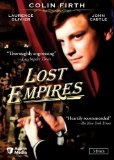| Reviews & Columns |
|
Reviews DVD TV on DVD Blu-ray 4K UHD International DVDs In Theaters Reviews by Studio Video Games Features Collector Series DVDs Easter Egg Database Interviews DVD Talk Radio Feature Articles Columns Anime Talk DVD Savant Horror DVDs The M.O.D. Squad Art House HD Talk Silent DVD
|
DVD Talk Forum |
|
|
| Resources |
|
DVD Price Search Customer Service #'s RCE Info Links |
|
Columns
|
|
|
Lost Empires
The theatrically inclined 1986 miniseries Lost Empires is best known for introducing a promising young actor, Colin Firth, in his first attention-grabbing role. It's also has the distinction of containing one of the final performances from the legendary Laurence Olivier. Big plusses for fans of Firth and Olivier, sure, but simple fact is that Lost Empires is a cracking good, historically opulent piece that has some cutting things to say about class distinctions -- mostly within the colorful confines of Britain's music hall scene of 1913-14. Like the acclaimed Downton Abbey, Lost Empires explores Great Britain during the period immediately preceding World War I, and how the seismic shift in attitudes during that time affected people on a human scale. The plush rooms of Downton Abbey might be a world away from the grimy backstage of Lost Empires, but they both explore the fact that, back then, hierarchies and one's social standing defined everything about a person. Up until the calamity of war broke all that up, that is.
Perhaps the best, first place to explore Lost Empires is to outline its main characters:
- Richard Herncastle (Colin Firth), budding performer and detached observer of the colorful theatre folk around him.
- "Uncle Nick" Ollanton (John Castle), magician whose years of performing have made him so jaded, he has ice cold water running through his veins.
- Cissie Mapes (Gillian Bevan), Nick's put-upon assistant in the magic act, hard on the outside but vulnerable and yearing for tenderness on the inside.
- Tommy Beamish (Brian Glover), crude "baggy pants" comedian who is one of the troupe's most popular performers. An arrogant man who has contempt for his fellow performers, especially ...
- Julie Blane (Carmen Du Sautoy), actress in Tommy's act, an older but still elegant woman who captures Richard's attention.
- Nancy Ellis (Beatie Edney), beautiful young singer, part of a sugary singing quintet. Nancy becomes another object of fascination for Richard.
- Harry Burrard (Laurence Olivier), over-the-hill comedian whose sad decline has driven him to alcoholism and paranoia.
- Lily Farris (Pamela Stephenson), blonde-tressed singer with a brittle, volatile nature; another woman whom Richard becomes attracted to, naturally (introduced in episode 5).
- Inspector Crabbe (Jim Carter), criminal investigator who takes a special interest in Richard and Nick after a murder occurs in the troupe (introduced in episode 6).
Minor Spoilers Ahead
Part 1 of this seven-part series begins with Richard on the battlefield. He becomes badly injured and a young woman, who had been observing from the sidelines, hurriedly comes to his aid. From then on, we hear Richard's blasé yet captivating narration on what happened with him in the past two years. After his last living parent dies, he encounters his darkly charismatic Uncle Nick at the funeral. Nick offers to take on Richard as a stage hand in his traveling act, an exotic magic routine in which he performs under the fancy pseudonym Ganga Dun. He meets others in the Ganga Dun troupe, including fragile Cissie and Barney (Mike Edmonds), an energetic little man. Richard drinks in the colorful acts in the traveling troupe, which encompass a dizzying variety of perfomers. At the top of the bill are Ganga Dun and Tommy Beamish, a comedian whose "naughty" act is a hit with audiences. Up-and-comers include a wholesome singing, dancing quartet, an acrobatic trio and an Italian opera singer. At the very bottom of the bill is pathetic old comedian Harry Burrard, whose act is booed nightly, but the other performers feel some paternal attachment to him. Speaking to Richard (who has been promoted to performing onstage in the act), Uncle Nick sums up the corrosive effects of the theatrical life with an acid-tinged speech. The soul-destroying that Nick warned about becomes readily apparent when Harry is found dead in his dressing room.
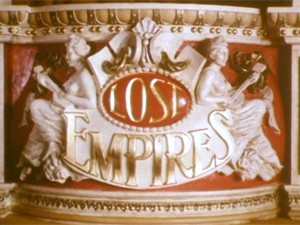
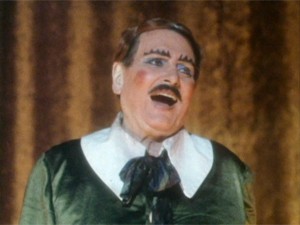
Burrard's funeral opens Part 2 on a somber note, but the troupe is soon back at work with a jaunty American song-and-jokes duo taking the old man's slot on the bill. Richard becomes entranced by Nancy Ellis, a fetching young singer who performs in a saccharine singing, dancing quintet. Meanwhile, Uncle Nick is approached by a local man (Hugh Cross) who wants Nick to use his magical abilities to make his suffragette leader wife (Rachel Gurney) disappear -- eluding the police after a big speech. Nick enlists the help of Richard and Julie Blane, an actress in the troupe who physically resembles the wife. At the climactic suffragette speech, the performers orchestrate an elaborate switcheroo which works out beautifully.
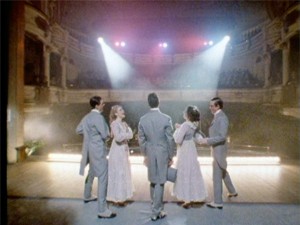
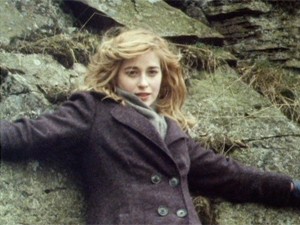
In Part 3, Richard adjusts to the abrupt exit of Nancy, whose act got booked on another tour. The void is promptly filled by Julie, however, with the older but still alluring woman having a cougar-like appetite for the dashing Richard. The two settle into something resembling a 1910s "friends with benefits" arrangement, but that doesn't sit well with Julie's employer, crude comedian Tommy Beamish. In Part 4, Tommy exacts revenge on Julie by hiring a brutish boxer to roughen them up. Julie is fired and replaced in Tommy's act. The injured Richard tries to go on performing, but he misses both Julie and Nancy and attempts to contact them. Julie makes an extra effort to avoid Richard, however, and the two move on -- and his letters to Nancy go unanswered. In a surreal final scene, Nick auditions a roomful of little men for the act.
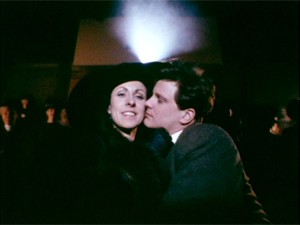
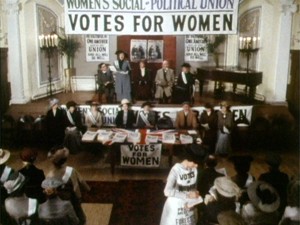
Part 5 introduces a new act to the troupe, singer Lily Farris, who trills sentimental (and wildly popular) tunes accompanied by her middle-aged pianist Otto Mergen (Alfred Marks). The two make for an odd couple, which fascinates Richard. When Lily asks budding artist Richard to sketch her portrait, the dark personality behind her sweetie-pie image emerges when she erupts in a tantrum. Later on, the contrite Lily and Otto try to curry Richard and Cissie's favor by inviting them to a party they're throwing. Richard and Cissie accept the invite, but leave early when the party takes on a strange, kinky turn. Richard nevertheless accepts another invitation for a smaller gathering with Lily, Otto and Lily's friend Phyllis (Andrea Gordon). The gay little soirée turns ugly when drugs are introduced; Lily and Otto urge Richard to do something unspeakable with the drugged-up Phyllis.
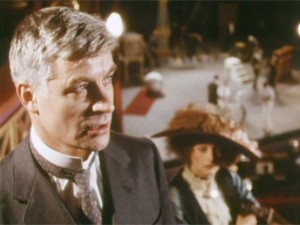
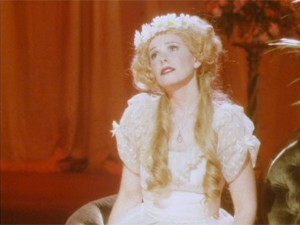
Part 6 opens with another tragedy when the female performer in the Colmars, an acrobatic trio, is found murdered. Cold-hearted Nick grows disappointed with Cissie's performances and fires her. While the Colmars' slot on the tour is taken by an Irish tenor, Cissie's role in Ganga Dun gets cast with a veteran actress friend of Nick's, Doris Tingley (Patricia Quinn). Summer arrives and the tour stops at the seaside town of Blackpool Beach. It's June 1914 and ominous newspapers headlines highlight the assassination of Archduke Franz Ferdinand of Austria. While residents are discussing the prospect of war, the murder investigation heats up with the arrival of Inspector Crabbe. Part 7 finds Crabbe honing in on Richard and Nick. He visits the two after a Ganga Dun performance and announces he will arrest the act's midget performer, Barney, for murder. Before it can be done, however, Nick pulls out another clever switcheroo and Crabbe's plans are foiled. Later on, Nick shocks the troupe by announcing he will disband the Ganga Dun act and ship off to America. With England gearing up in patriotic fervor for war, Richard decides to enlist in the army. The disapproving Nick lets Richard go, but not before delivering another acidic monologue. Richard, now in army fatigues, finds that the beautiful singer entertaining his unit is Nancy Ellis. Before long, we're back to the events starting Part 1 (with Nancy yelling for help) and wondering if bloodied Richard will survive -- and will he reunite with Nancy?
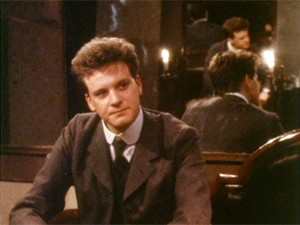
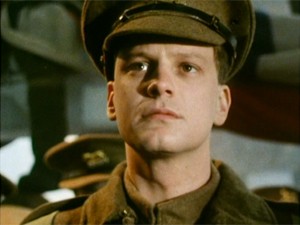
Something like Lost Empires has the potential to be either fantastic or an overstuffed bore, and the deliberate pacing of the series' first part almost points in the direction of the latter. Luckily the show winds up being completely absorbing, and that's mostly due to the lead actors' performances. Colin Firth not only looks great, he strikes the right balance of wonder and resignation with his narration. And John Castle is incredibly magnetic as Uncle Nick. Laurence Olivier contributes a strange little turn as Harry Burrard; he's good, but one has to wonder why he got an Emmy nomination for his efforts. Pamela Stephenson, best known for her one season on Saturday Night Live in the '80s, does a memorable job as flighty singing star Lily Farris.
The combo of great casting and historically accurate settings/costuming make Lost Empires incredibly evocative of the 1910s. This is especially true when it comes to the performing scenes, frequently scattered throughout all seven parts. You would think having so many music and comedy sequences would make the series choppy or dull, but they're very effective in conveying the era's changing times (Victorian era corn giving way to a syncopated combo doing "Alexander's Ragtime Band," for example). As the Brits would say, it's a jolly good show.
The DVD
Video:
Acorn Media's DVD edition of Lost Empires supplants an earlier release from 2002; based on the strictly OK picture quality it appears that it hasn't been remastered, however. Lost Empires was intentionally shot on grainy film stock meant to evoke a bygone era. The 4:3 picture presented on the DVD is somewhat faded but still nice, although it tends to get muddy in the darker ranges.
Sound: Lost Empires sports its original soundtrack in serviceable English mono, with optional SDH subtitles. Extras: Aside from a promo for other Acorn Media titles, the only extra is a small photo gallery on disc three. Lost Empires fans have speculated that scenes cut from the original U.K. broadcast might be restored for this edition; they don't appear here. This looks to be the same 410 minute version that was previously available, though now packaged in a slimmer case with a Firth-centric cover design. Final Thoughts: After a shaky start, Lost Empires brings the 1910s British theatrical scene to vivid life in evocative, addictive fashion. Stick around for rewarding, meaty performances from John Castle and a young Colin Firth. Highly recommended.
Matt Hinrichs is a designer, artist, film critic and jack-of-all-trades in Phoenix, Arizona. Since 2000, he has been blogging at Scrubbles.net. 4 Color Cowboy is his repository of Western-kitsch imagery, while other films he's experienced are logged at Letterboxd. He also welcomes friends on Twitter @4colorcowboy.
|
| Popular Reviews |
| Sponsored Links |
|
|
| Sponsored Links |
|
|
| Release List | Reviews | Shop | Newsletter | Forum | DVD Giveaways | Blu-Ray | Advertise |
|
Copyright 2024 DVDTalk.com All Rights Reserved. Legal Info, Privacy Policy, Terms of Use,
Manage Preferences,
Your Privacy Choices | |||||||









